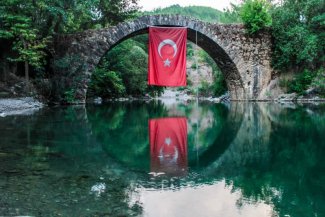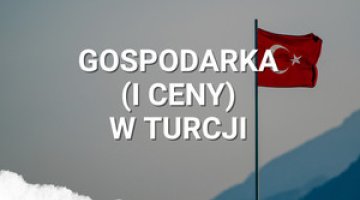Turkey after the elections. A new start?

Recep Tayyip Erdoğan and the Justice and Development Party (AKP) won the recent presidential and parliamentary elections, which means that the current political and social order in Turkey will be preserved. At present, the government camp has no strong political competition. However, it has to address numerous issues, the chronic economic crisis being the most pressing. Attempts to overcome it will require a socially costly resumption of an orthodox monetary policy, as well as increasing taxes and actively seeking foreign investments. For this reason, the AKP does not care about silencing domestic disputes or ending the country’s socio-political polarisation. On the contrary, it is likely to adopt a tougher stance on groups opposing the government, such as the Kurds or the secularised middle class. With regards to foreign policy, Ankara will continue to cooperate with the West, and to a lesser extent Russia. This policy will be characterised by numerous shifts and a transactional approach towards all its partners. Currently, Turkey is clearly trying to build closer ties with the West, proof of which includes its political consent to Sweden’s accession to NATO (which still needs to be ratified by the Turkish parliament) and its willingness to resume dialogue with the EU. However, these efforts do not mean a reset in Turkey’s relations with the West: the divergence of their interests, and above all their mutual distrust, are still high.
The political scene after the elections
Before the elections in May, the ruling camp faced a real risk of losing power to the opposition for the first time in two decades. Public opinion polls suggested a clear decline in support for President Erdoğan and his party, and some polls conducted at that time suggested that his opponent could win in the first round. The atmosphere during the elections in Turkey was tense due to the economic crisis and the aftermath of the tragic February earthquake.[1] Contrary to expectations, however, they ended in a sweeping victory for the ruling AKP party. This came as a confirmation of the absolute hegemony of Erdoğan and his party on the Turkish political scene and the absence of any alternative to their rule, at least for the moment.[2] After the elections the president formed a new cabinet, whose task is to focus on stabilising the economic and social situation in the country. The key figures in the newly appointed council of ministers are technocrats and close associates of Erdoğan. Controversial politicians have been removed from their positions, thanks to which the government has so far managed to maintain an image of consistency and predictability.
The Turkish opposition, which has lost every national election since 2002, has been plunged into crisis. The outcome of the May elections showed that even the unprecedented unification of these strongly diversified circles and the extraordinary mobilisation of the anti-government electorate were not enough for the opposition to win. The discussions over who was responsible for the defeat within the opposition led to a break-up of the electoral coalition formed by the Republican People’s Party (CHP), the largest opposition party, and five smaller parties. The CHP, whose chairman Kemal Kılıçdaroğlu was the coalition’s joint candidate for president, found itself in a deadlock. Party members began to express dissatisfaction with over a decade of his ineffective leadership, and as a result, they expect him to resign as leader.
There is a risk that in its present shape and with its present leadership, the CHP will (due as much to its own incompetence) become a de facto systemic opposition; at the same time it will be incapable of winning elections, while remaining content with the role it has played for over 20 years as the largest opposition grouping. If this scenario comes true, it will no longer offer a real alternative to the ruling camp, which will make it even easier for the government to maintain the façade of political pluralism in Turkey. Kılıçdaroğlu’s position in the party is currently under threat from the group gathered around Ekrem İmamoğlu, the charismatic mayor of Istanbul. A new CHP chairman is to be elected during the congress this autumn.
The domestic challenges: economy, migrations and polarisation
Although the political situation in Turkey has calmed down, the country still needs to deal with many challenges in domestic politics. The most serious is the long-term economic crisis, which has had a strong impact on the people of Turkey as it has raised the costs of living.[3] Turkey’s lower and middle classes have been impoverished due to high inflation (59% y/y in August this year) and the depreciation of the lira. These translate into a rapid increase in prices which cannot be matched by wages or the indexation of benefits. The minimum wage, which was raised to over 13,000 lira (gross) in June, is barely a third of the poverty line indicator for a four-person household, which was estimated at 39,700 lira.[4]
Turkey has responded to the crisis by resuming a conventional monetary policy. This was manifested by three successive rises of interest rates (from 8.5% to 25% overall) by the central bank, which is politically obedient to the government. Recently, indirect taxes have also been increased; for example, the basic VAT rate has gone from 18% to 20%, and excise duty on gas and fuel has also risen. Attempts to rebuild Turkey’s investment trust is an important element of the strategy adopted by the new Minister of Finance, Mehmet Şimşek. However, his influence on the economy may be limited due the president’s personal interference in this area; the government’s ultimate decisions, including those regarding financial policy, depend on Erdoğan’s views.
Another cause of social unrest is the influx of migrants. The presence of Syrian refugees is provoking more and more dissatisfaction among Turkey’s citizens. This dislike also extends to other immigrants from the Middle East, including Afghans and Iraqis who, like Syrians, are accused of crime, taking jobs, limiting access to public services and failing to adapt to life in Turkey. The influx of migrants is translating into an escalation of the nationalist sentiments that are constantly present in the country. These sentiments were manifested very clearly during the election campaign, so both the ruling camp and the opposition will be forced to respond to them. According to data from the Office of the United Nations High Commissioner for Refugees, 3.6 million Syrians are currently under temporary protection in Turkey.[5] According to the national migration office reports, the total number of foreigners living in Turkey in July this year was just over 4.8 million, or 5.74% of its population.[6] However, Turkish media often incorrectly repeat the claims of far-right politicians that the number of migrants in the country is much higher, perhaps as much as 13 million.[7]
Given the deteriorating economic situation and the lack of prospects for reversing the country’s authoritarian political trends, more and more people are emigrating from Turkey, especially to EU countries. According to surveys, as many as 61.3% of Turks aged 18 to 25 would like to leave the country.[8] This especially concerns educated specialists and academics, so in the long run the country may suffer from a brain drain.[9] Emigration has been constantly increasing since 2020: last year, around 139,000 Turkish citizens left their country, 26% up on 2021.[10]
Since those in power cannot find effective solutions to the country’s structural problems, they resort to manipulating the public mood by deliberately aggravating polarising topics; these include issues of identity, such as the place of religion in public life or the traditional family model. The government’s attacks are especially targeted at opposition circles, ethnic minorities, journalists and the LGBT community. Ideological issues, along with the economy and migration, will be at the core of the campaign ahead of the local elections scheduled for March 2024. The AKP wants to take power in the large cities run by the opposition. The elections in Istanbul, the largest Turkish metropolis, which İmamoğlu has governed since 2019, will be particularly important. His chances for re-election have fallen due to a series of lawsuits that may limit his right to run for public office. The opposition’s disorganisation and the crisis it is currently experiencing may also adversely affect its results in local elections. Unless the opposition parties cooperate, the votes will most likely be split between several candidates, and consequently the government camp will win.
Reviving relations with the West
Most of the parameters of Ankara’s foreign policy will likely remain unchanged after Erdoğan’s re-election. Turkey will still be a country which, on the one hand, is institutionally anchored in Western structures, while on the other it strives to maintain the widest possible room for manoeuvre in its contacts with all the major players on the international arena so as to maximise its own political and economic benefits. Turkey’s foreign policy will be characterised by a far-reaching, multi-vector approach. This means that recurring crises and phases of rapprochement will be inherent in its relations with its most important partners. In practice, this means that Ankara’s policy will include selective and opportunistic rapprochements with the West, Russia and the Arab states of the Persian Gulf. Its relations with this West will remain limited due to the distrust and reluctance towards Turkey which some NATO countries have manifested, resulting both from specific conflicts and political disagreements and from a more general criticism of the way Turkey’s domestic situation is developing.
Given Turkey’s close political, economic and military ties with the West, the relationship with it will continue to be a priority for the present government team. This is linked to the prestige and guarantee of security which NATO membership offers to Turkey, and the importance of ties with the EU for the Turkish economy. However, Turkey’s relations with the West are adversely affected by very serious systemic limitations resulting from its domestic policy (an authoritarian system of government, the persecution of political opponents and violations of human rights), repeatedly strained relations with individual EU member states (mainly Greece and Cyprus) and Ankara’s unwillingness to replace its multi-vector foreign policy (and the related benefits of this approach) with a policy closer to Western standards. Widespread anti-Western sentiments in Turkey will also further complicate these relations.[11]
Despite the numerous conflicts between Ankara and Western countries, it has become clear since the May elections that there is a chance for a new start in Turkey’s relations in both the transatlantic and EU contexts. Although a full reset is not yet an option, it is evident that Turkey is keenly seeking to deepen its dialogue and cooperation with the West. Turkey has been motivated to change its attitude by a number of factors. Firstly, it wants to present itself as a constructive and important member of NATO, and thus to strengthen its political position in the Alliance. Turkey is determined to build closer ties with the West partly because Russia is weakening and the internal political situation in Moscow is becoming increasingly unpredictable. To avoid becoming dangerously isolated, Turkey has to cooperate more closely with key NATO allies. The third but no less important reason is economic interests. Ankara has been making efforts to rebuild trust in the Turkish economy and to attract an inflow of international investments, especially from the EU and the West in the broader sense of the term.
Erdoğan declared his readiness to open a new chapter in Turkey-US relations during the NATO summit in Vilnius in July this year. At the same time, however, it is difficult to expect that this unilaterally declared desire to strengthen ties will actually lead to a resolution of the numerous conflicts that have been generated for years by political tensions between the two countries. These include the dispute over removing Turkey from the F-35 programme and the imposition of CAATSA sanctions on it for the purchase of the Russian S-400 air defence system, closer Greek-American military cooperation (to Ankara’s disadvantage, due to Washington’s declining trust in it), and American military support for Kurdish organisations in Syria, which the Turks believe to be sister groups of the Kurdistan Workers’ Party (PKK).[12] At present, the sale of F-16 fighters to Turkey is another serious problem. This project has been politically supported by the Biden administration, but its implementation has been blocked by the Congress, which will only grant its consent on condition that Turkey accepts Sweden’s accession to NATO and guarantees that the planes will not be used in operations against Greece. Hence, Erdoğan’s promises regarding the quick ratification of Sweden’s membership in the Alliance should be considered a big step towards obtaining consent to purchase the F-16s. The Turkish-Greek initiative regarding the resumption and normalisation of mutual relations will also certainly help soften Congress’s critical stance on Ankara.[13] This means there is a chance that the sale of the American fighter jets to Turkey will go through, though further political twists can be expected in the process. If no agreement is reached between Ankara and Washington, there will probably be further stalling on the Turkish side. The purchase of the F-16s seems to be the only Turkish-American dispute that stands an immediate chance of being resolved.
When it comes to relations with the EU, Turkey will hope for the formal resumption of the accession process, although it treats visa-free travel for its citizens and the expansion of the current customs union as more important (albeit currently unrealistic) goals. The latter is of particular importance for Ankara as it would allow for increasing exports of Turkish agricultural products and services to the EU, which would consequently improve the country’s economic situation. The start of the process of rebuilding Turkey-EU relations, as announced by the President of the European Council Charles Michel, is a sign that both sides are willing to improve relations and resume dialogue. However, this process will not be easy due to numerous tensions and conflicts between individual EU member states and Ankara. The most serious of these include the unresolved conflict over Cyprus and the sensitive issue of maritime borders in the Mediterranean Sea. Since many EU member states share a negative stance towards Erdoğan’s authoritarian rule, violations of the rule of law and the deteriorating status of ethnic minorities, and generally on how Turkey respects freedom and human rights, this will adversely affect the unfreezing of Turkey’s accession process. However, it cannot be ruled out that the resumption of the dialogue between the EU and Ankara regarding its accession may contribute to a temporary improvement in mutual relations, or in an optimistic scenario, even to enhancing them.
Closer to Russia?
Despite the ongoing strategic confrontation between Moscow and the West, Turkey will continue its close cooperation with the Kremlin in selected areas, primarily economic cooperation (energy and trade), and will maintain channels of political dialogue with it. This state of affairs is unlikely to change, regardless of the situation in and around Russia. Energy and trade are the areas of key importance for the Turkish economy, and are thus critical for the stability of Erdoğan’s rule.
At the same time, since Russia’s position on the international stage has significantly weakened, Turkey may have more room for manoeuvre in contacts with the Kremlin, and could expect concessions from it. This means it can maximise its benefits from cooperation with Moscow, especially in the energy sector. Ankara will strive to force further concessions from Russia during negotiations on more favourable gas contracts, or for the further deferral of payments for the gas it imports. At the same time, it will maintain its willingness to cooperate in the potential construction of a Turkish-Russian gas hub in Turkey, hoping that this will help it to gain more regional importance as a gas transit route.[14] Regarding trade, both countries want to maintain or even increase the current level of goods exchange, and since Ankara has not joined the Western sanctions against Russia (which gives Moscow an opportunity to bypass them) this will make it easier. On the other hand, Turkey will want to deepen its cooperation with Russia covering the purchase of oil and grain, and will insist on Moscow restoring the grain corridor agreement, as this would bring political and financial profits to Ankara.
Turkish-Russian cooperation will also be focused on resolving the conflict in Syria. Ankara hopes that the Kremlin will take greater consideration of Turkish interests in Syria as a result of its improving position vis-à-vis Moscow, which has been weakened by the Ukraine war. From Turkey’s viewpoint, Russia is playing a crucial role in this aspect, considering its close political and military ties with Damascus. Ankara wants to use Moscow as an intermediary to force Bashar al-Assad to give guarantees regarding combating the Kurdish groups operating in northern Syria and the informal Kurdish autonomy structures, moves which will be of benefit for Turkey. A partial normalisation of Turkish-Syrian relations would also help solve the pressing issue of relocating Syrian refugees staying in Turkey. However, the Syrian issue is extremely difficult to solve, and the attitude of Russia itself can be described – at best – as ambivalent. Proof of this includes its support for the repeated attacks by the Syrian armed forces on areas controlled by the Turkish troops located in northern Syria, in particular the Idlib and Aleppo regions.
Turkey’s cooperation with Ukraine will continue to be a potential problem in its relations with Russia. Ankara will carry on supporting Kyiv politically and militarily, and has emphasised its willingness to act as a mediator. As for the South Caucasus, Turkey will strive to further consolidate its regional position, including by enhancing its cooperation with Azerbaijan, while at the same time trying to avoid straining its relationship with Moscow any further.
The reset with the Middle East continues
Another of Turkey’s strategic goals is to further normalise its relations with the Gulf states and Egypt. These relations broke down due to the Arab Spring, and more specifically as a result of Ankara’s political attitude: at that time it supported the mass protests, which was contrary to the interests of the Gulf states and the stability of their political regimes. However, in recent years the normalisation of the situation in the Middle East, the effective failure of Turkey’s regional ambitions and the financial crisis in this country have opened up a real opportunity for a political and economic reset in contacts with its former rivals, Egypt and the Arab states of the Persian Gulf. One sign of this is the restoration of political and trade relations between Turkey, Saudi Arabia and the United Arab Emirates that has been taking place for around two years. Relations between Turkey and Egypt broke down in 2013 after Turkey sided with the Muslim Brotherhood during the Arab Spring. The complete resumption of diplomatic relations between them announced at the beginning of July this year as part of the normalisation of their relations is also part of these efforts.[15] Saudi Arabia and the United Arab Emirates made major investments, estimated at around $50 billion, in Turkey in July this year, which is another sign of their improved relationships.[16] Turkey is expected to further strengthen cooperation with these Middle Eastern countries over the coming months. It will want to continue the political reset as this would create new opportunities and climates for investment, and would contribute to increasing the volume of trade with these countries.
[1] For more information on the pre-election situation, see A. Michalski, ‘Election of the century in Turkey’, OSW Commentary, no. 512, 5 May 2023, osw.waw.pl.
[2] The result of the presidential runoff was as follows: Recep Tayyip Erdoğan won 52.18%, Kemal Kılıçdaroğlu 47.82%. The elections to the Meclis, Turkey’s parliament: 323 out of 600 seats went to the People’s Alliance (the AKP, MHP and YRP), 212 to the Nation Alliance (CHP and İYİ) and 65 to the Labour and Freedom Alliance (YSP and TİP).
[3] The Turkish economy is not in recession and is formally still growing, but Turkey’s GDP has lost its growth dynamics. In 2021 this indicator was 11%, but in 2022 it fell to 5.5% (according to the Turkish Statistical Office).
[4] ‘Türk-İş Ağustos 2023 Açlik ve Yoksulluk Sınırı’, Türk-İş, 29 August 2023, turkis.org.tr.
[5] Refugees and Asylum Seekers in Turkey, United Nations High Commissioner for Refugees, unhcr.org.
[6] F. Sevinç Çetin, Y. Kalyoncuoğlu, ‘Göç İdaresi Başkanlığından, Türkiye'deki göçmen sayısına ilişkin açıklama’, Anadolu Ajansı, 16 July 2023, aa.com.tr.
[7] G. Güllü, ‘Türkiye’de 13 milyon sığınmacı olduğu iddiası’, Anadolu Ajansı, 16 May 2023, aa.com.tr.
[8] A. Çağlar (red.), The Turkish Youth Study 2023, Konrad-Adenauer-Stiftung Derneği Türkiye Temsilciliği, June 2023, kas.de.
[9] ‘Brain drain among Turkish academics is at alarming levels, report shows’, duvaR.english, 12 April 2023, duvarenglish.com.
[10] Based on data from the Turkish Statistical Institute, data.tuik.gov.tr.
[11] A. Michalski, ‘Anti-Western sentiments in Turkey’s politics’, OSW, 7 March 2023, osw.waw.pl.
[12] Idem, ‘A catalogue of disputes. The head of Turkish diplomacy visits the US’, OSW, 25 January 2023, osw.waw.pl.
[13] ‘NATO members Greece and Turkey pledge to ‘reset’ ties and bypass longstanding disputes’, Associated Press, 12 July 2023, apnews.com.
[14] A. Michalski, ‘Russian-Turkish plans to build a gas hub’, OSW, 27 October 2022, osw.waw.pl.
[15] F. Bayat, ‘Türkiye-Egypt relations enter new era: Ankara’s ambassador to Cairo’, Anadolu Agency, 6 July 2023, aa.com.tr/en.
[16] A. Michalski, Z. Krzyżanowska, ‘Erdoğan visits the Gulf States: closer cooperation’, OSW, 24 July 2023, osw.waw.pl.





